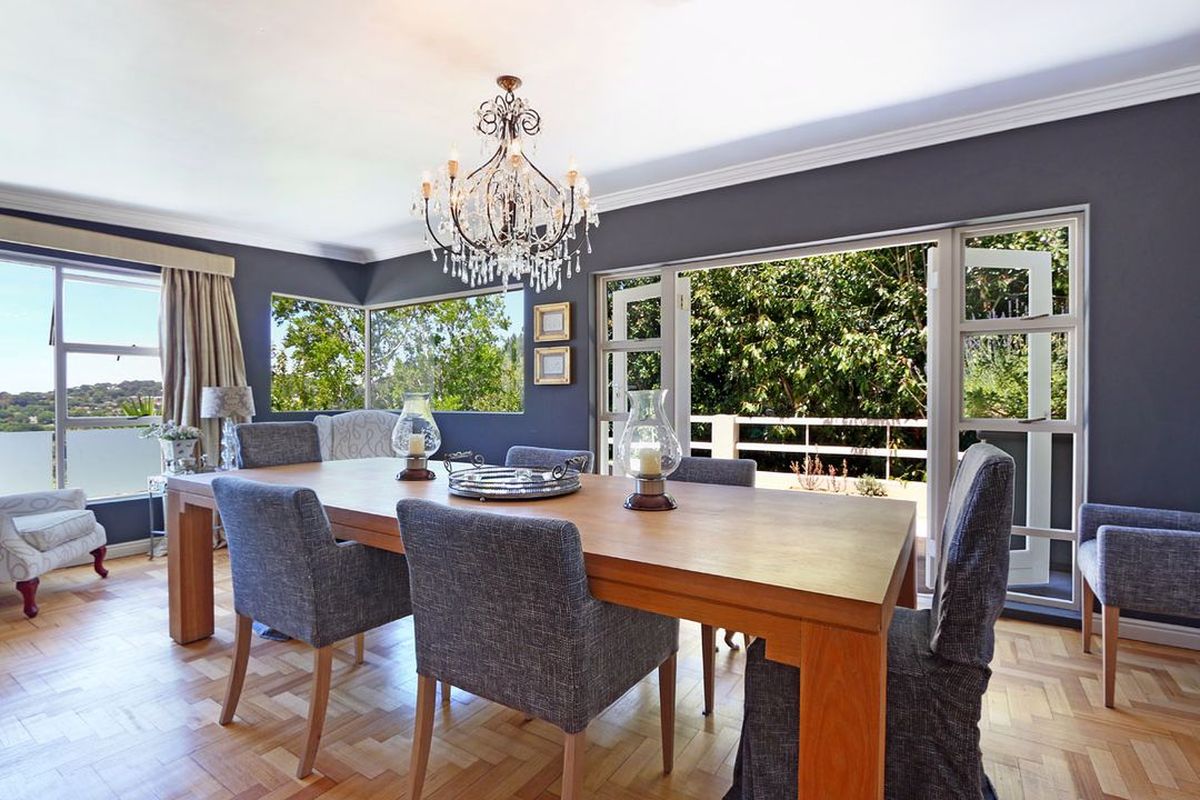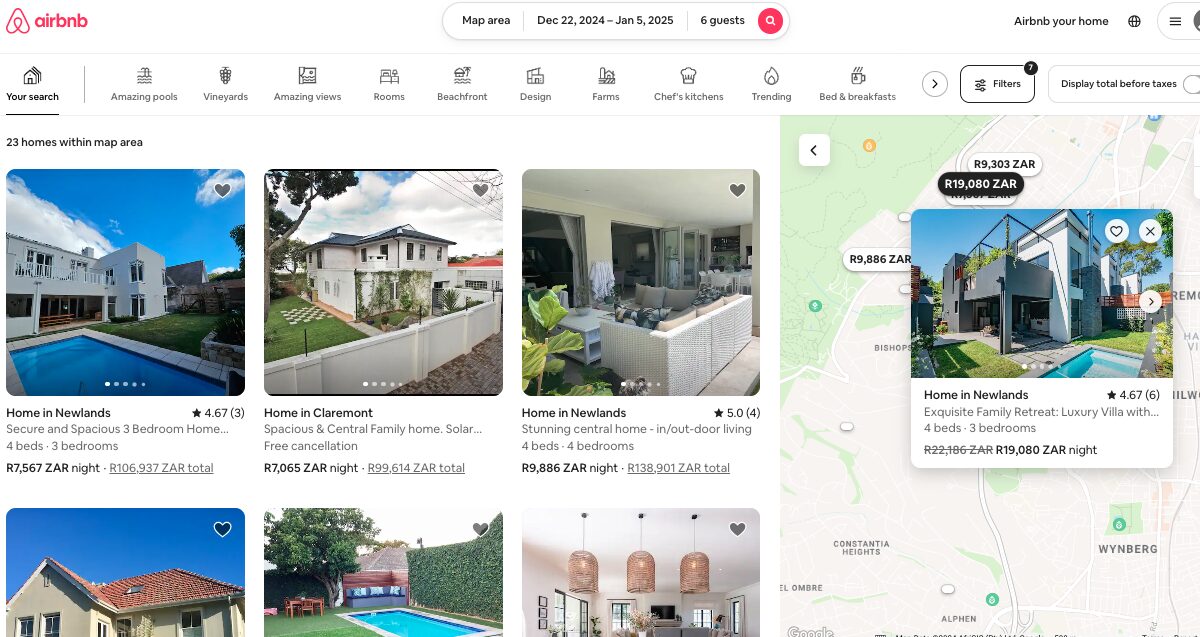
Recently, CapeHolidays faced an exciting opportunity: listing a stunning 450 sqm modern oasis in the heart of Newlands, Cape Town. And we decided to use our Cape Town Airbnb pricing strategy. This executive home boasts:
As we prepared to list this luxurious Newlands property on Airbnb, we faced a critical question: How do we price this home competitively for the peak season (December 20 to January 5) while maximising the owner’s returns? It can be done. Let’s work through the easy Cape Town Airbnb pricing strategy.
This challenge provided the perfect case study to demonstrate our methodical approach to a Cape Town Airbnb pricing strategy. In this article, we’ll walk you through our step-by-step process for setting the optimal price for this Newlands gem, which applies to any Cape Town Airbnb property.
As a Cape Town Airbnb host or property manager, setting the right price for your rental can make or break your success, especially during the peak holiday season. At CapeHolidays, we’ve developed a methodical approach that maximises returns while remaining competitive.
Let’s dive into how we establish the best possible peak daily rate for a new Airbnb listing.
Before we discuss or Cape Town Airbnb pricing strategy, it’s crucial to understand the unique dynamics of the Cape Town holiday rental market. With its stunning beaches, world-class wineries, and iconic Table Mountain, Cape Town sees a surge in demand during the summer peak season. This presents a golden opportunity for Airbnb hosts but requires careful price positioning to stand out in a crowded market.
In Cape Town's Airbnb market:

For this example, let’s say we’re considering a rate of R15,000 per night for a luxury property in Newlands during peak season. This R15000 is based on experience. But is this rate competitive? Let’s find out.
Conduct thorough market research: Head to Airbnb as a “guest” and follow these steps:
As you refine your search, the properties will become fewer and fewer. The more unique a property is, the less competition it will have. Although we are researching a 3-bedroom, there are very few 3-bedrooms and even larger ones with three or more ensuite bedrooms and a guest loo.
Review the remaining properties, paying attention to the following:
You are trying to isolate the most comparable properties. Depending on the sample size, you should get similar, better or not so great properties to compare,
In our Newlands example, we found:
Consider the ‘Asking vs. Selling’ Price Dynamic. Remember, the listed price isn’t always the final selling price. Be prepared to adjust your rates based on demand and booking lead times. Read more here on practical examples explaining Airbnb’s asking vs selling price dynamic.
Remember, you make money with high occupancy. High rates are useless if it does not sell!
This principle encourages property managers to find the optimal balance between price and occupancy to maximize overall revenue, rather than focusing solely on high rates.
Establish a clear understanding with property owners about the potential need to adjust rates. This transparency builds trust and sets realistic expectations.
While we’ve focused on peak season pricing, this methodology can be adapted for year-round Airbnb host pricing in Cape Town. Always consider:
Not only can you use Airbnb to check competitiveness. But this is just the start. You need to consider supply and demand, how lead time to book changes over time and you need to set proper minimum stays – especially over peak period.
At CapeHolidays, we go beyond the "set and forget" approach. Our Cape Town Airbnb Pricing strategy and optimization is a dynamic, ongoing process that ensures your property remains competitive and profitable year-round. Here's what sets us apart:
We continuously monitor market conditions, guest feedback, and booking patterns. Our Lead Time to Book (LTB) analysis helps gauge demand, allowing us to adjust rates strategically and attract quality guests who plan ahead.
We continuously monitor market conditions, guest feedback, and booking patterns. Our Lead Time to Book (LTB) analysis helps gauge demand, allowing us to adjust rates strategically and attract quality guests who plan ahead.
We continuously monitor market conditions, guest feedback, and booking patterns. Our Lead Time to Book (LTB) analysis helps gauge demand, allowing us to adjust rates strategically and attract quality guests who plan ahead.
We continuously monitor market conditions, guest feedback, and booking patterns. Our Lead Time to Book (LTB) analysis helps gauge demand, allowing us to adjust rates strategically and attract quality guests who plan ahead.
We fine-tune minimum stay requirements and adapt our approach seasonally. This balance maximizes your income during peak periods while maintaining flexibility in slower times, optimizing your annual revenue.
We keep you informed about our strategies and market trends. This transparency ensures you understand how we're working to optimize your property's performance, creating a true partnership in your Airbnb success.
Read moreBy leveraging this advanced Cape Town Airbnb pricing strategy, we don’t just manage—we nurture its growth in the competitive Cape Town Airbnb market. We aim not only to meet but exceed expectations, turning properties into a top-performing asset in the short-term rental market.
Mastering our Cape Town Airbnb pricing in Cape Town requires a blend of thorough market research, competitive analysis, focusing on trust and flexible thinking. By following this guide, you’ll be well-equipped to set rates that attract guests while maximizing your rental income.
Remember, pricing is both an art and a science. Don’t be afraid to adjust your strategy as you gain more experience and data. And if you’re looking for expert help in managing your Cape Town Airbnb, CapeHolidays is here to assist with our years of local market expertise.
Unlock your holiday rental potential!